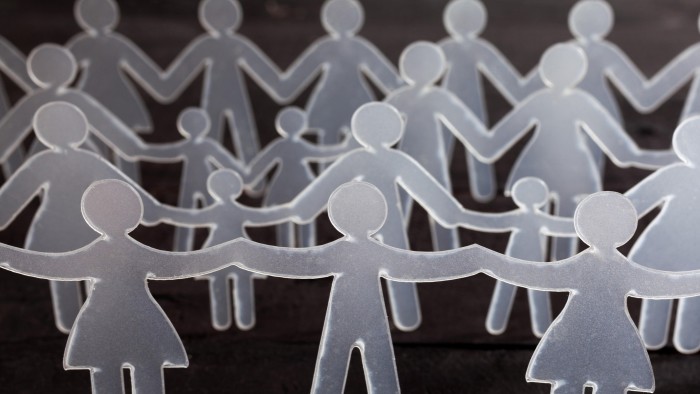Unlock the Editor’s Digest for free
Roula Khalaf, Editor of the FT, selects her favourite stories in this weekly newsletter.
The writer is group chief executive of Nesta, a UK innovation charity
When my father was orphaned after fleeing on foot from Myanmar (then Burma) to Chennai during the second world war, he had to borrow a rupee from his uncle just to sit a school entrance exam. What propelled him into the medical career that eventually brought him to England was not just academic talent or a good school — it was becoming best friends with two boys from a higher caste and class, both determined to become doctors. As he tells it, their confidence and ambition became his.
Friendships can change your life — particularly those that span class boundaries and expand horizons. I have seen the power of such friendships in my own family. But while the impact of friendship on social mobility has long been theorised, only recently has it become possible to test empirically. Large-scale data allows us to measure what was once mere anecdote. Harvard professor Raj Chetty’s US research shows that one of the strongest predictors of upward mobility is having friends from higher-income backgrounds — he calls this “economic connectedness”.
New research confirms this pattern in the UK, too. The Behavioural Insights Team, owned by Nesta, worked with Meta to repeat Chetty’s US analysis on 20mn UK residents’ Facebook accounts, linking them to tax and education data.
In the 10 per cent of areas in England where people from low-income backgrounds have the most friendships with those from high-income backgrounds, children from poorer homes earn 38 per cent more per year on average (£5,100) as adults relative to low-income children in the 10 per cent of areas with the least such friendships. This holds even when you take account of other factors.
Unsurprisingly, our study found that people with more friends reported being happier and more satisfied with their lives, had lower levels of feeling isolated and higher trust in others and in institutions. But the effect is particularly pronounced when those friends are from high-income backgrounds.
So what can be done to multiply such friendships, now we know that they are a vital ingredient in social mobility? First, through land-use planning policies and right to buy, the UK has already managed to promote neighbourhoods where homeowners rub shoulders with social renters, and should continue to do so. Enforced social mixing of this sort is one reason why poorer people in the UK have a quarter more friends with above average incomes than is the case in America. Remarkably, almost half of the friends of people in poorer communities earn more than the average.
Second, nurseries and primary schools inevitably reflect the make-up of the immediate neighbourhood but secondary schools are less constrained. Allocating places in oversubscribed schools by lottery rather than distance from the school gates would increase mixing, but be contentious — only 3 per cent of schools use this admissions tool. An alternative is to take advantage of falling secondary school rolls in most of the country, and expand choice. Widening access to free school transport would be a start.
Third, our research reveals another challenge — even when living in mixed neighbourhoods or schools, people tend to gravitate towards those from a similar social class — what Chetty called “friending bias”. Hobby or activity groups, often online but with in-person connections, are shown in the Facebook data to be particularly strong ways of promoting cross-class friendships.
Take the Brooklyn Stroll Club, which meets on Saturday mornings in a small park. About 35 fathers from across New York gather with their young children to walk together. The group is as socially varied as it is large, co-ordinated through a Discord channel — an online platform where more than 1,200 dads share advice and organise gatherings. The strolls mix South Bronx shop workers with Harlem construction workers and Manhattan creative types and their kids.
There is a broader lesson here, though: building social capital should be a goal rather than just a byproduct. The UK still has a Whitehall department with “communities” in its name; it should be measuring social capital systematically. In the same way we routinely run experiments to improve education or health outcomes, let’s trial ways of improving how people interact in person at work, school or in their neighbourhood.
Social mobility for individuals means economic growth for nations. Reducing loneliness and ill health eases pressure on welfare and healthcare. We are social animals and if modern habits are preventing genuine connection with others, policymakers should step in.
